Catégories
|
Thésaurus IAMM > SYSTEME AGROALIMENTAIRE
SYSTEME AGROALIMENTAIRESynonyme(s)Système alimentaireVoir aussi |
Documents disponibles dans cette catégorie (1060)
 Ajouter le résultat dans votre panier Affiner la recherche
Ajouter le résultat dans votre panier Affiner la recherche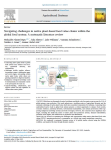
Article
M.A. Dipu ; J. Checco ; L. Williams ; Y. Sultanbawa ; N.A. Jones ; A. Abdul Aziz |CONTEXT While there are thousands of native food plants worldwide, only four major crops account for 50 % of global primary crop production. This trend underscores a troubling erosion of agricultural diversity and the systematic sidelining of na[...]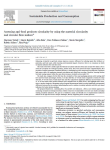
Article
Assessing agri-food products circularity by using the material circularity and circular flow indices
H. Tetteh ; M. Balcells ; A. Bala ; P. Fullana-i-Palmer ; M. Margallo ; R. Aldaco ; R. Puig |Enhancing circularity in agri-food systems improves resource efficiency by reducing inputs like fertilisers or pesticides, and food waste, while lowering environmental impacts. However, there is no consensus on which circularity indicators best [...]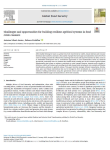
Article
After steadily declining for years on a global level, food crises driven by conflict, climate extremes and economic downturns have marked an increase in the number of people who face hunger and malnutrition since 2015. Food crises are leading co[...]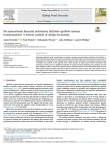
Article
J. Porciello ; P. Winters ; M. Farrae ; J. McKenna ; L. Phillips |Supporting agrifood system transformation to improve outcomes around climate, nutrition, and inclusion requires that institutions and governments work together. International financial institutions play a pivotal role in shaping global developme[...]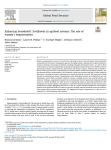
Article
R. Cavatassi ; L.M. Phillips ; G. Maggio ; Z. Anteneh ; A. Mabiso |Women's empowerment is crucial not only for their well-being but also for the well-being of entire households, communities and economies. Closing gender gaps and increasing women's empowerment in agrifood systems is critical to achieving a broad[...]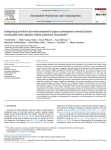
Article
V. Kyttä ; H.U. Ghani ; T. Pellinen ; A. Kårlund ; M. Kolehmainen ; A.-M. Pajari ; H.L. Tuomisto ; M. Saarinen |Environmentally sustainable and nutritionally adequate food consumption and production can include a wide selection of foods, which requires detailed information on individual food products to enable sustainable food choices. The aim of this stu[...]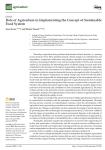
Article
Nowadays, agriculture faces problems that threaten its basic function, i [...]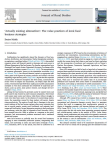
Article
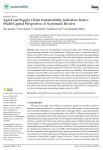
Article
A. Amamou ; S. Chabouh ; L. Sidhom ; A. Zouari ; A. Mami |The concept of sustainability in agri-food supply chains (AFSCs) is gaining traction among researchers and practitioners. There has been a considerable effort to define and identify frameworks for assessing, monitoring, and improving sustainabil[...]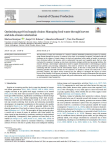
Article
Optimising agri-food supply chains: managing food waste through harvest and side-stream valorisation
The importance of reuse and valorisation as a means to enhance sustainable production practices, by reducing waste streams through the recovery of resources in the chain, is increasingly recognised. Confronted with new challenges in the context [...]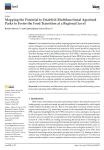
Article
Food transition has been widely inspiring regional and local food system transformation strategies to accomplish the Sustainable Development Agenda goals. Considering the urgency required to transform food systems by 2030, actions should be supp[...]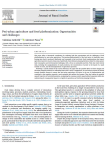
Article
This paper offers a theoretical contribution by outlining both the opportunities and the challenges of food platformisation for peri-urban agriculture. The growing platformisation of the food sector is drastically transforming how food is produc[...]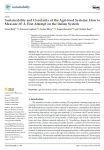
Article
G. Betti ; F. Gagliardi ; A. Mecca ; A. Riccaboni ; C. Tozzi |The agri-food sector is undergoing profound transformations driven by ecological and digital transitions, as well as evolving consumer and nutritional choices. These shifts pose significant challenges but also open new opportunities for business[...]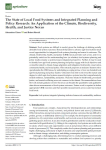
Article
Food systems are difficult to model, given the challenge of defining socially desirable food system outcomes. Research that aims to advance agri-food systems must reveal opportunities for integrated food systems planning and assess its outcomes.[...]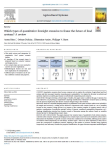
Article
CONTEXT Quantitative scenarios have become common tools to explore the evolution of agricultural and food systems and their necessary transition towards greater sustainability. Yet, despite the diversity in methods and questions explored, a nota[...]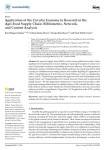
Article
The agri-food supply chain (AFSC) is vital to ensure global food security. It faces significant environmental and economic challenges, requiring the adoption of circular economy (CE) principles to enhance sustainability and resource efficiency. [...]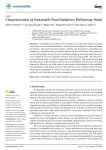
Article
S.G. Florença ; A.L. Amaral ; F. Costa ; R.P.F. Guiné ; C.A. Costa |A sustainable food system can be described as a system that ensures economic, social, and environmental sustainability to secure food and nutrition for current and future generations. The present research aimed to identify and characterize susta[...]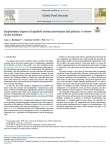
Article

Article
V. Guerrieri ; S. Borchardt ; G. Listorti ; L. Marelli ; M. Vittuari |The unsustainable nature of prevailing food systems contributes to drive humanity out of a safe operating space. Despite recognising the need for food systems transformation, its direction diverges into different sustainability narratives and co[...]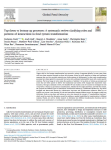
Article
C. Conti ; A. Hall ; E.A. Moallemi ; A. Laila ; C. Béné ; J. Fanzo ; M.F. Gibson ; L. Gordon ; C. Hicks ; K. Kok ; N. Rao ; R. Laxminarayan ; D. Mason-D'Croz |Urgent calls for food system transformation have spurred a variety of responses globally. In some cases, these calls have been answered through top-down led processes, driven by public agencies to design and implement measures that can drive soc[...]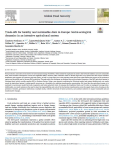
Article
A. Jiménez-Aceituno ; M.D. López-Rodríguez ; A.J. Castro ; S. Cortés-Calderón ; D. Collste ; G. Aparicio ; L. Rölfer ; M.A. Bote ; L. Marín ; M.A. Gómez-Tenorio ; B. González-Martín |Food production and trade are key drivers of environmental change worldwide. Global initiatives emphasize the need to shift towards healthier and more sustainable diets, with increased consumption of fruits and vegetables (F&V). However, F&V cul[...]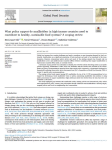
Article
K.-A. Gill ; N. Teimouri ; J. Bogard ; K. Cullerton |Global food systems face complex challenges and need to transform to meet increasing demand for food, sustainably. Smallholders are a significant population of food producers and need to be considered in this transformation. However, internation[...]
Article

Article
The paper explores the complex relationship between digital and ecological transitions, particularly focusing on their interdependence and potential to drive sustainability. It acknowledges that digitalization, while offering numerous benefits s[...]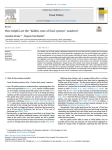
Article
The “hidden costs of foods systems” calculations reported by the Food and Land Use Coalition, the Food System Economic Commission and the UN Food and Agriculture Organization may not provide helpful policy guidance for the transformation of food[...]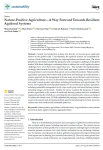
Article
M. Kaushal ; M. Atieno ; S. Odjo ; F. Baijukya ; Y. Gebrehawaryat ; C. Fadda |Current food production systems rely heavily on resource-poor small-scale farmers in the global south. Concomitantly, the agrifood systems are exacerbated by various a/biotic challenges, including low-input agriculture and climate crisis. The re[...]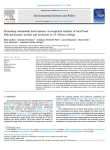
Article
E. Carloni ; C. Giordano ; G.N. Di Fiore ; L. Mulazzani ; M. Setti ; L. Falasconi ; V.M. Govigli |African food systems are increasingly challenged by climate change, market instability, globalization, urbanization, and recent global crises. Such challenges, along with a mismatch between consumers' preferences and production opportunities, ar[...]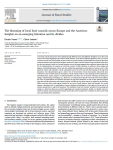
Article
Local food councils (LFCs) have been studied through different lenses and different disciplines across the social sciences since their beginning in the 1980s in North America. Given their worldwide expansion, there is a need to assess the curren[...]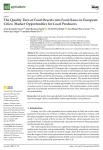
Article
L. Fernández-Casal ; E. Karakaya Ayalp ; S.P. Öztürk ; L.M. Navas-Gracia ; F. Geçer Sargin ; J. Pinedo-Gil |The current conventional food system is led by large-scale agribusinesses, characterized by industrialized production and increasing distance between food production and consumption. In response, alternative food initiatives (AFIs) have typicall[...]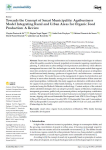
Article
C.P. Sá ; R.N. Pagani ; A.L. Przybysz ; F.F. Souza ; D.N. Resende ; J.L. Kovaleski |Smart cities leverage information and communication technologies to enhance urban life quality, essential in densely populated environments requiring comprehensive planning. A critical area in urban settings is food production and delivery, wher[...]









